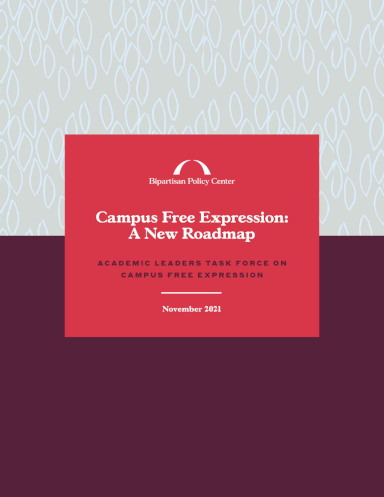This report was produced by the Campus Free Expression Project when it was still part of the Bipartisan Policy Center.
Two core principles of higher education—academic freedom and free expression—are undergoing a period of great stress. There is overwhelming survey research and other evidence that the intellectual climate on many college and university campuses is being constrained. Faculty are deterred from exploring certain subjects and expressing candid opinions even off campus; students are self-censoring; outside speakers are disinvited and events are being canceled. Social media has become a megaphone that amplifies campus controversies, increasing their intensity and visibility, compressing time frames for a leadership response, and leading to investigation and sanctioning of faculty and students. The traditional understanding of free speech as a liberalizing force is itself being called into question.
The chilling of campus speech is having effects beyond the borders of the campus. Rather than alleviating the political polarization in our nation today, the inhibition of campus speech is degrading the civic mission of higher education, which is to maintain our pluralistic democracy by preparing students for civic participation as independent thinkers who can tolerate contrary viewpoints and work constructively with those with whom they have principled disagreements.
To be successful in upholding their institutional mission amid today’s changing social, civic, and political landscape, college leaders need a new roadmap for campus free expression.
The Bipartisan Policy Center convened our task force to explore the factors that have made free expression so fraught and to make recommendations about how to foster a campus culture of robust intellectual exchange, open inquiry, and free expression.
As a task force, we believe each campus needs an approach that fits its unique history, mission, and community. An approach that suits a public flagship university will not fit a small, denominational campus. Even as principles of academic freedom and free expression apply across campuses, in this period of stress on these principles, each college must examine and affirm these principles through its own processes. That is why, as a task force, we do not endorse specific statements, policies, curricula, or programming, although we are providing a resource guide of programs and approaches, including those used with success by task force members and other campuses. Our common recommendations are for elements of a free expression strategy, as well as processes for developing and implementing a strategy, in the context of shared governance.
We believe that college leaders must take on four challenges directly:
- Colleges and universities must address the perceived tension that pits academic freedom and freedom of expression against diversity, equity, and inclusion in creating a respectful learning environment for all. While not ignoring that there may be expression that is hurtful, we believe profoundly that free expression is an essential means to an inclusive campus in addition to being essential to higher education’s academic and civic missions.
- Colleges and universities should take steps to encourage more viewpoint diversity on campus. Exposing students to a wide range of perspectives and methods of confronting issues is essential for both a well-rounded education and as preparation for the rigors of citizenship in a diverse society.
- Colleges and universities should adopt strong policies for the protection of free expression for students and faculty, to forestall hasty or ad hoc responses to controversial expression, and to defend the expression of unorthodox and controversial views.
- Colleges and universities should elevate the skills and dispositions necessary to academic and civic discourse as a deliberate aim of the collegiate experience. Formal protections for free expression are necessary but insufficient to create a culture of free expression, open inquiry, and respectful, productive debate on campus and in our country. We have a national civic skills deficit, which colleges and universities have an essential role in remedying. Matriculating students typically need coaching and instruction in these skills and habits of mind, and our aim should be to graduate students who raise the bar for national discourse.



